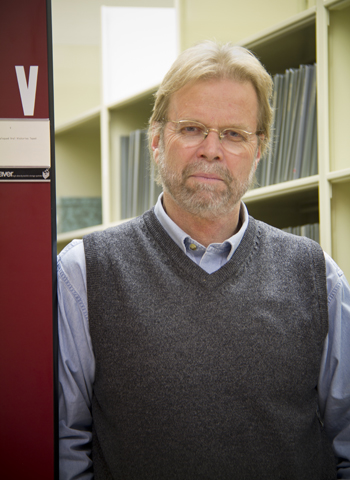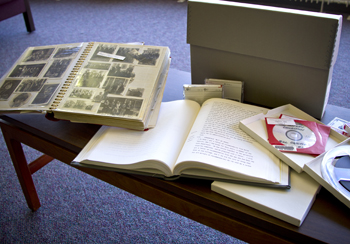Posted 9:31 p.m. Thursday, Feb. 9, 2012

 [/caption]
[/caption]
Oral History Program going digital
Discs are replacing reel-to-reel tapes in UW-La Crosse’s Oral History collection. The switch not only saves space, but also time for historians collecting the inspiring stories and the researchers trying to find them. For more than three decades, university historians have sat down with area residents and others to capture — on tape — their personal stories about the Mississippi River, their ancestors, the university, as well as life in western Wisconsin. When they completed the interviews on reel-to-reel tapes, keyboarders transcribed them word-for-word. Researchers looking for historical information didn’t have to listen to an entire tape while seeking specific information, but they had to read an entire transcript to find references in the lengthy interviews. With digital recording, the interviews no longer have to be transcribed. Instead, researches can simply enter key words or phrases to search the interviews and instantly hear what they’re researching. “That instant access has considerable value over transcriptions that were never indexed,” explains History Professor Charles Lee, who directs UW-L’s Oral History Program. “The digitizing of the interviews allows us to be more true to the source of the history. As academics, we try to stay closest to the primary source and this is as close as you can get.” Lee says the national trend for oral historians is to go digital. While recorded tape is somewhat more reliable than compact discs, digitizing interviews is much more convenient and user-friendly. More than 3,000 hours of interviews are recorded on tapes in Murphy Library’s Special Collections. Most will stay that way. Some topical collections — like remembrances of 100 UW-L alums and 50 Mississippi River “rats” — are being converted to CDs. All future interviews will be recorded digitally. Lee says by digitalizing interviews, researchers can make cross-references among collection topics. “That’s a big step,” he notes. More than 50 extensive interviews about the Mississippi River have been converted from tape to be indexed on disc by two undergraduate history students. “They are now expert indexers,” Lee notes. Eventually, software will automatically index interviews that are recorded on discs. [caption id="attachment_9563" align="alignleft" width="350" caption="Researchers looking for historical information didn’t have to listen to an entire tape while seeking specific information, but they had to read an entire transcript to find references in the lengthy interviews. "] [/caption]
Lee says the most recent local project being recorded is the relocation of the village of Gays Mills in Crawford County. The interviews are capturing the stories of Gays Mills residents as they move from the flood-prone town on the Kickapoo River.
Lee says stories of those living on rivers – first the Mississippi and now the Kickapoo – have become common for the Oral History Project. “This has become our trademark over recent years,” notes Lee. “Given our location in the Seven Rivers Region, this make perfect sense.”
But the project isn’t limiting its scope to the region. UW-L history faculty conducted interviews in Tanzania last summer. This summer, interviews in Egypt will add to the program’s first worldly sounds.
“It’s really history outside the book,” says Lee
[/caption]
Lee says the most recent local project being recorded is the relocation of the village of Gays Mills in Crawford County. The interviews are capturing the stories of Gays Mills residents as they move from the flood-prone town on the Kickapoo River.
Lee says stories of those living on rivers – first the Mississippi and now the Kickapoo – have become common for the Oral History Project. “This has become our trademark over recent years,” notes Lee. “Given our location in the Seven Rivers Region, this make perfect sense.”
But the project isn’t limiting its scope to the region. UW-L history faculty conducted interviews in Tanzania last summer. This summer, interviews in Egypt will add to the program’s first worldly sounds.
“It’s really history outside the book,” says Lee
